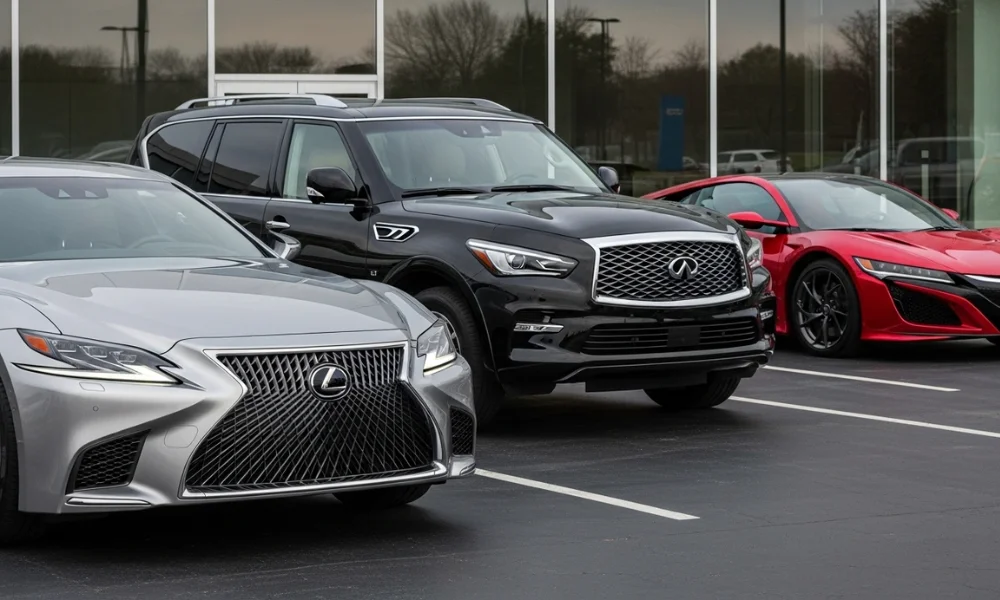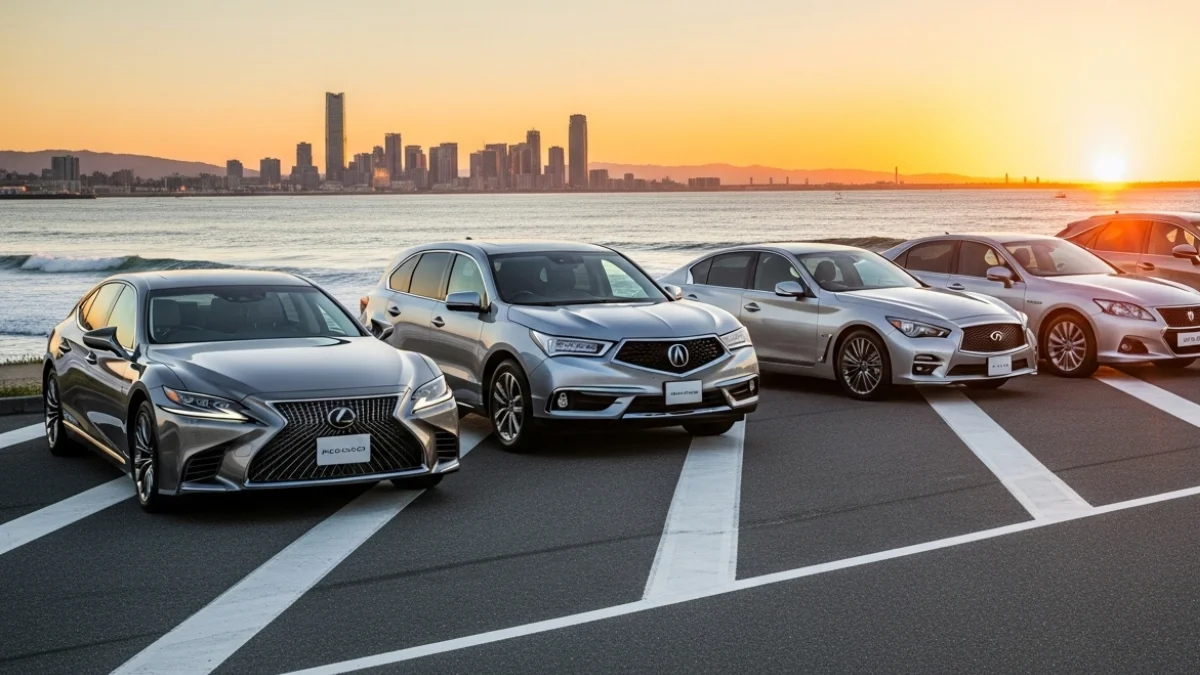Japanese luxury cars strike a perfect balance between style, performance, and everyday reliability. They combine advanced technology, premium materials, and careful craftsmanship for discerning drivers. If you’re exploring Japanese luxury cars, this guide explains top brands, models, and tips.
Overview of Japanese Luxury Cars
Japanese luxury cars offer innovation, comfort, and a focus on long-term value. These vehicles rival those of European and American luxury models in terms of comfort and technology. They give buyers a practical yet premium choice for sedans, SUVs, and hybrids.
What Makes Them Luxury
Luxury in Japanese cars means more than leather seats and shiny badges. It shows in quiet cabins, precise build quality, and innovative safety features. Japanese luxury vehicles seamlessly blend tradition and innovation, offering a refined driving experience.
Japan vs Europe/US
Japanese luxury car brands prioritize reliability and comfort over flashy prestige. These cars often cost less yet still include advanced features and offer strong resale value. Compared to European luxury models, Japanese cars shine in value and maintenance costs.
Table: Japanese vs European vs American Luxury Cars
| Feature | Japanese Luxury Cars | European Luxury Cars | American Luxury Cars |
|---|---|---|---|
| Reliability | Very High, Lower Costs | High Prestige, Higher Costs | Moderate Reliability, Varies |
| Price & Value | Competitive, Strong Resale | Premium, High Depreciation | Moderate to High Pricing |
| Performance & Tech | Balanced, Advanced Technology | Performance-Focused, Cutting Edge Tech | Comfort and Size Focus |
| Brand Prestige | Growing, Practical Luxury | Established, Heritage Brands | Mixed Prestige, Comfort-Oriented |
Top Japanese Luxury Car Brands

Japan’s top luxury car brands each bring their own style and value. They include Lexus, Infiniti, Acura, and some special domestic models. Knowing these brands helps you choose the Japanese luxury car that best suits your needs.
Lexus
Lexus is the flagship among Japanese luxury car brands worldwide. It combines advanced hybrid technology, refined interiors, and legendary reliability for discerning buyers. Lexus models, such as the LS sedan and RX SUV, deliver premium comfort at smart pricing.
Infiniti
Infiniti blends Japanese precision with bold styling and dynamic driving performance. Its models offer powerful engines, innovative cabins, and competitive pricing against rivals. Infiniti luxury cars, such as the QX80 SUV, give families spacious luxury with strong dependability.
Acura
Acura combines sporty performance with premium, comfortable features for modern drivers. The brand offers sports sedans like TLX and performance icons like NSX. Acura suits buyers who want a fun yet practical Japanese luxury car experience.
Special Models
Japan also produces unique luxury cars outside mainstream brands for niche buyers. The Toyota Century is a hand-built luxury sedan favored by executives and royalty. Nissan Cima and Fuga represent hidden gems in the Japanese domestic luxury market.
Best Japanese Luxury Car Models
Japanese luxury cars cover sedans, SUVs, hybrids, and performance vehicles alike. They blend advanced features with the reliability Japanese brands are known for. These top picks demonstrate Japan’s strong competition with global luxury car makers.
Flagship Sedans
Flagship sedans like the Lexus LS bring full-size luxury to everyday life. The LS 500h hybrid combines strong power with impressive eco-friendly efficiency, making it a great choice for drivers. These models are perfect for executives or travelers who value quiet and comfort.
Luxury SUVs
Japanese luxury SUVs are designed for families who want style and practicality. Models like the Lexus RX and LX combine spacious interiors with advanced safety technology. They deliver a premium driving experience on highways and even in off-road conditions.
Performance Cars
Performance luxury models highlight Japan’s ability to mix speed with refinement. Cars like the Acura NSX and Nissan GT-R consistently deliver supercar thrills. They appeal to enthusiasts who want excitement without sacrificing everyday usability.
Heritage Models
Japan also produces timeless luxury vehicles with deep cultural significance and tradition. The Toyota Century stands out as a symbol of understated prestige worldwide. Classic models, such as the Nissan President, showcase decades of Japanese craftsmanship and innovation.
How to Choose Japanese Luxury Cars

Selecting the right Japanese luxury car involves striking a balance between budget, needs, and personal taste. These vehicles encompass sedans, SUVs, hybrids, and performance models to suit every lifestyle. Understanding your priorities helps you select a car that truly fits you.
Budget
Japanese luxury cars span a wide price range, catering to a diverse range of buyers. Entry-level models, such as the Acura ILX, offer affordability with premium touches built in. Flagship sedans and SUVs are more expensive but offer top-of-the-line features and prestige.
Use Case
Think carefully about how you’ll use your Japanese luxury car daily. Commuters may prefer efficient hybrids, while families often need spacious SUVs. Performance-focused drivers can opt for sporty sedans or supercar-level models, such as the NSX.
Hybrid Options
Japanese brands lead the way in hybrid and electric technology for luxury vehicles globally. Models like Lexus LS 500h and RX Hybrid reduce fuel costs without losing power. Electric and plug-in hybrid versions are emerging rapidly to meet the needs of eco-conscious buyers.
Maintenance
Ownership costs matter as much as the purchase price of any car. Japanese luxury vehicles are renowned for their reliability and consistently hold strong resale value worldwide. Parts and servicing are easier to find compared to many European competitors.
Import & Ownership
Many people import Japanese luxury cars to get unique models or better prices. Understanding import costs, regulations, and service availability is crucial before making a purchase. This section highlights key points that every prospective importer should carefully consider.
Costs
Importing a Japanese luxury car involves shipping fees, taxes, and customs duties. These costs can significantly increase the total price of ownership over time. Planning ahead helps avoid unpleasant surprises and ensures a smoother buying process.
Compliance
Imported vehicles must meet your country’s safety and emissions standards before registration. Some Japanese luxury cars may need modifications to comply with local laws. Checking regulations in advance saves time, stress, and money after the car arrives.
Service
Reliable servicing keeps your luxury car running smoothly for many long years. Ensure local mechanics are familiar with Japanese luxury vehicles and their parts, making them easily accessible. This makes ownership easier and preserves strong resale value over time.
Resale
Japanese luxury cars tend to hold their value better than those of their global competitors. Models with strong reliability and hybrid options tend to depreciate more slowly than their rivals. This makes them smart long-term investments compared to some European luxury cars.
Japanese car vs European car

Deciding between Japanese and European luxury cars depends heavily on your priorities. Japanese models emphasize reliability and affordability, while European brands offer heritage and prestige. This section helps you clearly weigh the key pros and cons.
Performance
European luxury cars often deliver higher horsepower and sharper handling, making them a favorite among enthusiasts. Japanese luxury performance models, on the other hand, focus on balanced power and everyday usability. For most drivers, this combination offers a satisfying and practical driving experience.
Prestige
European brands have a longer history of luxury prestige worldwide. Japanese luxury car brands are gaining respect thanks to quality and constant innovation. This shift makes Japanese models attractive to buyers who value substance over name recognition.
Value
Japanese luxury cars are renowned for their reliability, low maintenance, and strong resale value. European models may initially impress, but they can prove to be significantly more expensive over time. This makes Japanese luxury vehicles appealing to cost-conscious luxury seekers everywhere.
Maintenance
Maintenance costs for Japanese luxury cars are generally lower than those for European ones. Parts are easier to source locally, and overall servicing is less expensive. This advantage adds to the total value and long-term ownership satisfaction.
Conclusion
Japanese luxury cars offer a compelling mix of style, technology, and everyday value. From Lexus and Infiniti to Acura and unique models like the Toyota Century, there’s something for every taste. Explore our recommendations, compare features, and discover the ideal Japanese luxury car that suits your needs and budget today.












